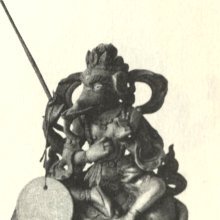Ganapatideva, Gaṇapatideva, Ganapati-deva: 2 definitions
Introduction:
Ganapatideva means something in the history of ancient India. If you want to know the exact meaning, history, etymology or English translation of this term then check out the descriptions on this page. Add your comment or reference to a book if you want to contribute to this summary article.
Images (photo gallery)
India history and geography
Source: Shodhganga: Kakati Ganapatideva and his timesGaṇapatideva (गणपतिदेव) mahārāja (r. 1199-1262 A.D.) was the greatest of the Kākatīya dynasty who rose to prominence in the confused political condition of Āndhra during the eleventh and twelth centuries. The history of Āndhra during this period was characterised by the fearful conflicts between the Rāṣṭrakūṭas and the Veṅgī Cālukyas and later between the Cālukyas of Kalyāṇa and the Colas of Tanjore for hegemonic control over the rich and prosperous east coast.
Gaṇapatideva, the third independent king in the dynasty had a long regnal period of 63 years (A.D. 1199-1262) and it witnessed the political unification of Āndhra which led to alround economic development and remarkable cultural achievements.
Source: OpenEdition books: Vividhatīrthakalpaḥ (History)Gaṇapatideva (गणपतिदेव) (ca. 1199-1261) is one of the eight kings of the Kākatīya dynasty inhabited the village of Kaṃkati, as mentioned in the Vividhatīrthakalpa by Jinaprabhasūri (13th century A.D.): an ancient text devoted to various Jaina holy places (tīrthas).—cf. Eight kings of the Kākatīya dynasty inhabited the village of Kaṃkati: Mādhavarāja, Puraṃṭirittamarāja, Piṇḍikuṇḍimarāja, Prollarāja, Rudradeva, Gaṇapatideva, Rudramahādevī and Pratāparudra. Only the duration of Rudramahādevī's reign is specified: thirty-five years.
Note: On the Kākatīya kings, see Yazdani 1960 p. 575-665. [...]

The history of India traces the identification of countries, villages, towns and other regions of India, as well as mythology, zoology, royal dynasties, rulers, tribes, local festivities and traditions and regional languages. Ancient India enjoyed religious freedom and encourages the path of Dharma, a concept common to Buddhism, Hinduism, and Jainism.
See also (Relevant definitions)
Partial matches: Deva, Ganapati, Teva.
Full-text (+99): Mahadeva, Keta, Akranda, Tikkana, Recerla, Mallikarjuna, Tantrapala, Pandita, Ketana, Parshinigraha, Bayyaram, Ari, Mattamayura, Udasina, Gona, Parimalakara, Mitramitra, Kayastha, Madhyama, Guru.
Relevant text
Search found 4 books and stories containing Ganapatideva, Gaṇapatideva, Ganapati-deva, Gaṇapati-deva; (plurals include: Ganapatidevas, Gaṇapatidevas, devas). You can also click to the full overview containing English textual excerpts. Below are direct links for the most relevant articles:
The history of Andhra country (1000 AD - 1500 AD) (by Yashoda Devi)
Part 23 - Bhimadeva Kesavadeva (A.D. 1231-1235) < [Chapter XX - The Telugu Cholas (Chodas)]
Part 1 - Gangaya Sahini (A.D. 1244-1256) < [Chapter XIX - The Kayasthas (A.D. 1220-1320)]
Part 5 - Sarngadhara II (A.D. 1253-1267) < [Chapter XIV - The Yadavas]
Sermons in Stones < [July – September, 2001]
Leaders and Landmarks of Telugu Literature < [June 1939]
‘The Triple Stream’ < [October 1956]
Gati in Theory and Practice (by Dr. Sujatha Mohan)
Technical treatises on Nāṭya (other works) < [Chapter 1 - Nāṭya]
Matangalila and Hastyayurveda (study) (by Chandrima Das)
